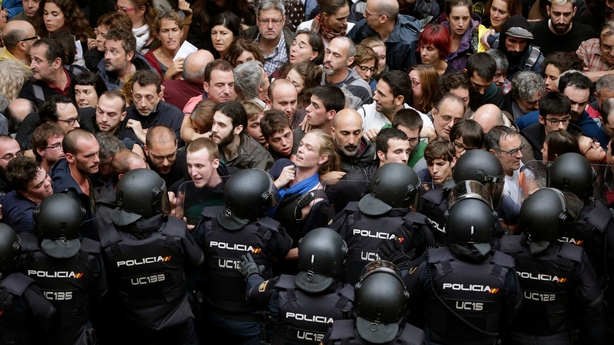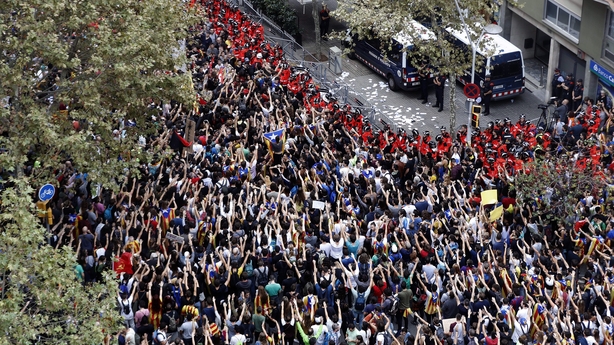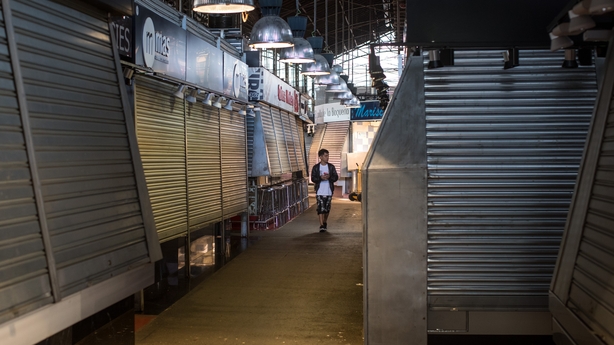The Catalan government is set to declare independence from Spain in a matter of days, regional leader Carles Puigdemont has said.
Mr Puigdemont said his government would "act at the end of this week or the beginning of next", in an interview with the BBC.
Earlier he said the referendum is valid and its result must be implemented.
Some 700,000 people took to Barcelona's streets to protest against police violence during the banned independence referendum at the weekend, city police have said.
As the entire region went on general strike, Catalans protested throughout the day in various rallies, calling on the EU to intervene in an escalating face-off between Catalan separatist leaders and Madrid.
Metro stations were shut down in Barcelona, dozens of roads were blocked and state workers walked out in response to a call for a general strike by pro-independence groups and trade unions.
Many small businesses also shut down for the day.
Catalonia, Spain's richest region, has its own language and culture and a political movement for secession that has strengthened in recent years.
Pro-independence parties who control the regional government staged the referendum in defiance of Spanish courts that ruled it illegal.
Some 900 people were injured on polling day when police fired rubber bullets and charged at crowds with truncheons to disrupt the vote.

Those who participated voted overwhelmingly for independence, a result that was expected since residents who favour remaining part of Spain mainly boycotted the vote.
Opinion polls conducted before the vote suggested only a minority of around 40% of residents in the region back independence, although a majority want a referendum to be held.
Protesters said the violent police crackdown against the ballot had energised the secessionist camp.
"What happened on 1 October has fired up independence feeling that will never die," said 18-year-old student Monica Ventinc, who attended a further protest.
Spain's Constitutional Court prohibited the vote, siding with the central government which argued that it contravened the country's 1978 constitution which bars breaking up the country.
King Felipe VI has said he was committed to the unity of Spain as he accused Catalan leaders of shattering democratic principles and of dividing Catalan society.
In a televised address to the nation, the king said the "irresponsible behaviour" of the Catalan leaders had undermined social harmony in Catalonia.
"Today Catalan society is fractured and in conflict," he said.
He said the Spanish crown was strongly committed to the Spanish constitution and to democracy and underlined his commitment as king "to the unity and permanence of Spain."
The referendum has plunged Spain into its worst constitutional crisis in decades, and is a political test for Prime Minister Mariano Rajoy, a conservative who has taken a hard line stance on the issue.
Outside of Catalonia, Spaniards mostly hold strong views against its independence drive.
Several demonstrations unfolded throughout Catalonia.
To the north of Barcelona, a line of tractors moved down a road blocked to traffic, accompanied by protesters chanting "Independence!" and "The streets will always be ours!"
Crowds gathered outside the local headquarters of Spain's ruling People's Party and the Spanish national police headquarters in Barcelona, whistling and waving the red-and-yellow regional flag.

"In no way can we accept that they come here with this kind of repression," taxi driver Alejandro Torralbo, standing outside the PP headquarters, said of Sunday's police action.
Spain's Deputy Prime Minister Soraya Saenz de Santamaria said Mr Puigdemont and his regional government had lost respect for the democratic process and were showing a flagrant disregard for the law.
"I've seen how President Puigdemont has flooded the streets with his followers to stop people obeying the law and to make them disrespect justice," she said.
"We are here to defend the rights and liberties of all Spaniards that have been trampled upon by the regional government."

With 95% of the vote counted, authorities said the Yes vote stood at 90.1%, on a turnout of 2.26 million of 5.34 million registered voters.
Mr Rajoy has defended the police action and said more than 400 police officers needed medical attention.
Scenes of armoured Spanish police swinging truncheons and firing rubber bullets at peaceful voters have been widely condemned, with the European Union calling for talks to break the stalemate between Madrid and Barcelona.
On Sunday, Mr Rajoy said the ballot had failed, while Mr Puigdemont vowed to continue with the independence process.

